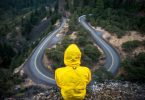After painting Duryodhana’s corrupt consciousness, the scene shifts to the war etiquettes heralding the beginning of the fratricidal war. In order to increase (sañjanayan) Duryodhana’s (tasya) joy (harṣaṁ), the valiant (pratāpavān) grandsire of the Kuru dynasty (kuru-vṛddhaḥ), the grandfather (pitāmahaḥ), [Bhīṣma] blew (dadhmau) his conch (śaṅkhaṁ) very loudly (vinadyoccaiḥ), sounding like the roar of a lion (siṁha-nādaṁ). (BG 1.12) Henceforth (tataḥ), the conches (śaṅkhāś ca), drums (bheryaś ca), kettledrums (paṇavānaka), and horns (gomukhāḥ) were all suddenly (sahasaivā) sounded at the same time (abhyahanyanta), and that combined sound (sa śabdas) became (abhavat) tumultuous ( tumulo). (BG 1.13)
The spotlight now goes to the central characters of the Bhagavad Gita. Krishna (mādhavaḥ) and Arjuna (pāṇḍavaś caiva), situated on (sthitau) a great (mahati) chariot (syandane) yoked with (yukte) white horses (śvetair hayair ), next (tataḥ) blew (pradadhmatuḥ) their divine (divyau) conches (śaṅkhau). (BG 1.14) Unlike all the conches blown so far, the conches blown by Krishna and Arjuna are referred to as divine.
The conches held by Krishna and the Pandavas have been uniquely identified. Lord Krishna (hṛṣīkeśo) blew Pāñcajanya (pāñcajanyaṁ); Arjuna (dhanañ-jayaḥ) blew Devadatta (devadattaṁ); the voracious eater (vṛkodaraḥ) and performer of herculean tasks (bhīma-karmā), [Bhīma] blew (dadhmau) the great conch (mahā-śaṅkhaṁ), Pauṇḍra (pauṇḍraṁ). (BG 1.15)
King (rājā) Yudhiṣṭhira (yudhiṣṭhiraḥ), Kuntī’s son (kuntī-putro), blew Ananta-vijaya (anantavijayaṁ), and Nakula and Sahadeva (nakulaḥ sahadevaś ca) blew Sughoṣa and Maṇipuṣpaka (sughoṣa-maṇipuṣpakau). Great archer (parameṣv-āsaḥ) – the King of Kāśī (kāśyaś ca), great fighter – Śikhaṇḍī (śikhaṇḍī ca mahā-rathaḥ), Dhṛṣṭadyumna (dhṛṣṭadyumno), Virāṭa (virāṭaś ca), unconquerable (cāparājitaḥ) Sātyaki (sātyakiś), Drupada (drupado), the sons of Draupadī (draupadeyāś ca), and the mighty-armed (mahā-bāhuḥ) son of Subhadrā (saubhadraś ca) – all (sarvaśaḥ) blew (dadhmuḥ) their respective conches (śaṅkhān pṛthak pṛthak). (BG 1.16-18)
Tumultuously resounding (tumulo ’bhyanunādayan) in the sky (nabhaś ca) as well as on the earth (pṛthivīṁ caiva), that vibration (sa ghoṣo) shattered (vyadārayat) the hearts (hṛdayāni) of the sons of Dhṛtarāṣṭra (dhārtarāṣṭrāṇāṁ). (BG 1.19) This is an early indication of the victory of the Pandavas.







